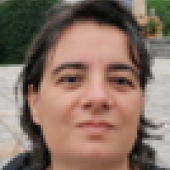
Dr. Rancati Tiziana
Researcher
Contacts
- Mail: tiziana.rancati@istitutotumori.mi.it
- Tel: 0223903787
Specialty / Department
- Medical Physics
Tiziana Rancati is a senior physics researcher engaged in translational research in the field of outcome modelling after oncological treatments. Following her MS degree in Physics and PD in Medical Physics at the University of Milan, she has developed extensive experience in modelling treatment outcomes, with a specific focus on integrating clinical factors, treatment details, biological characteristics, and imaging features.
Her scientific activities include the development and validation of predictive models, the use of machine learning and mechanistic simulations, the implementation of quantitative instrumentation to generate longitudinal patient data for digital twin applications, and the integration of genetic, imaging, inflammatory, and microbiota biomarkers into risk models.
She is the scientific coordinator and principal investigator of several national and international projects in the fields of integrated modelling and personalized radiotherapy, radiomics, and radiogenomics.
She is an active member of several international consortia and working groups, including QUANTEC, PENTEC, REQUITE/RADPrecise, the RadioGenomic Consortium, the ESTRO “Biological Modelling for Precision Medicine” working group, the OECI Accreditation and Auditing programme, and the Radiomics and Dosiomics working groups of the Alliance Against Cancer. She also serves on the Research Committee of the Italian Association of Medical Physics (AIFM).
She holds editorial roles in international scientific journals and contributes to advanced training initiatives in radiobiology, modelling, and computational oncology.
Active as PI
- “TETRIS”Risk assessment Tools for severe side Effects after breasT Radiotherapy: radiation safety through biological extended models and dIgital twinS. HORIZON-EURATOM, 2024-2027.
- “PerPlanRT: Personalised planning in radiotherapy through integrative modeling of local dose effect and new dosimetric constraints”, ERAPerMed, 2021-2024
Past as PI
- “RAD-PRECISE: Personalized radiotherapy: incorporating cellular response to irradiation in personalized treatment planning to minimize radiation toxicity”. Funded by “Joint transnational call for proposals (2018) for research projects on personalised medicine – smart combination of pre-clinical and clinical research with data and ICT solutions”, ERAPerMed, 2019-2022
- “Mechanistic computational modelling of radiation damage to microvasculature and of its effect on tumour microenvironment”. Funded by AIRC, 2019-2024.
- “Identification and validation of biomarkers and new therapeutic targets in prostate cancer: microstructural evaluation of prostate cancer through multiparametric resonance imaging”. Funded by Fondazione Italo Monzino, 2019-2022.
Active as Co-applicant
- Microbiota-based prediction of radiation enteropathy after radiotherapy for high-risk prostate cancer. Funded by Prostate Cancer UK, 2023-2027. Co-Applicant.
Past as Scientific Coordinator
- “Proof Of Concept Artificial Intelligence for Active Surveillance in Prostate Cancer (POC)”. Funded by INT Scientific Directorate, 2021-2024.
- “Identification and validation of biomarkers and new therapeutic targets in prostate cancer: evaluation of the individual risk of radioinduced side effects after radiotherapy for prostate cancer.” Funded by Fondazione Italo Monzino, 2019-2022.
- “RadioTherapy Toxicity Prediction based on biological, dosimetric and clinical parameters for patients treated for localized prostate cancer and head-and-neck cancer o (RTTox-biodos)”. Funded by Neolys Diagnostics (Lion), 2017-2018.
- “MICRO-LEARNER - MICRObiota, infLammatory Environment, clinicAl and Radiomic features as predictors of Normal tissue response in radiotherapy for prostatE and head-and-neck cancer”. Funded by Fondazione IRCCS Istituto Nazionale dei Tumori-Valorizzazione delle Ricerca Fondi 5per1000, 2016-2020.
- “Modelling toxicity after high dose RT for prostate cancer: validating clinical, dosimetric and molecular factors”. Funded by AIRC, 2015-2017.
- “Identification and validation of new therapeutic targets and biomarkers in prostate cancer: Micro-structure evaluation of prostate cancer through magnetic resonance imaging”. Funded by Fondazione Italo Monzino, 2014-2017.
- “Identification and validation of new therapeutic targets and biomarkers in prostate cancer: Predictive models for urinary toxicity and erectile dysfunction after high dose external beam radiotherapy for prostate cancer”. Funded by Fondazione Italo Monzino, 2014-2017.
- “Validating Predictive Models and Biomarkers of Radiotherapy Toxicity to Reduce Side-Effects and Improve Quality of Life in Cancer Survivors. REQUITE”. Funded by European Union’s 7th Framework Programme for research, technological development and demonstration, 2013-2018. Coordination of dosimetry data and of modelling for prostate cancer.
- Mail: tiziana.rancati@istitutotumori.mi.it
- Tel: 0223903787
Data Science
Causal Inference for radiotherapy
Digital twins for radiotherapy
maging biomarkers for treatment response
Microenvironment-on-chip for chemo-radiotherapy testing
MRI Imaging for Active Surveillance in Prostate Cancer
The effect of the microbiota on the efficacy and side effects of radiotherapy
Toolkit for Radiotherapy Data Quality Assurance and Dosimetric Metrics
Last update: 28/05/2025
